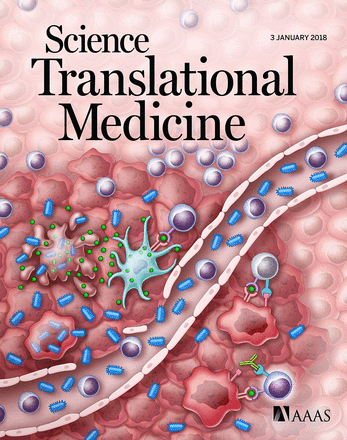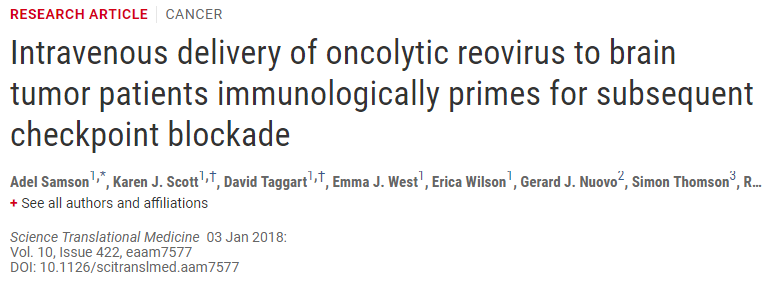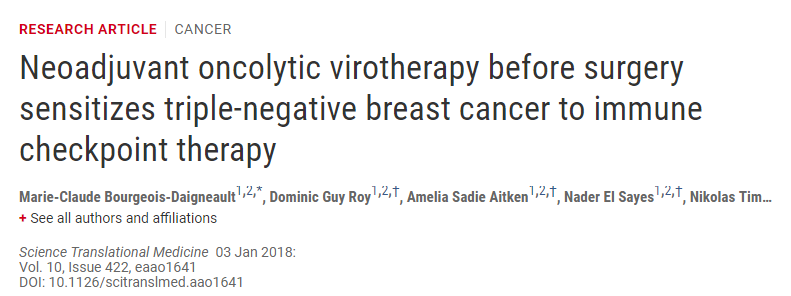Science Translational Medicine 10 (422): Oncolytic virus immunotherapy breakthrough again
In the 10th issue of the 422th issue of Science Translational Medicine, the new results of oncolyticvirus-related immunotherapy were on the cover in the journal Science Translational Medicine 10(422). Scientists demonstrated that oncolytic virus can fight against multiple cancerswhen combined with immunity-checkpoint inhibitor.

Bourgeois-Daigneault, Samson and their colleagues show how oncolytic virus treatment improves the efficacy of subsequent immune checkpoint blockade against different cancer types.
【Science Translational Medicine】
One study published in the journal Science Translational Medicine reported that, a virus -reovirus - injected directly into the bloodstream could be used to treat people with aggressive brain tumors. The title of this study is “Intravenous delivery of oncolytic reovirus to braintumor patients immunologically primes for subsequent checkpoint blockade”.

Up to now, scientists thought it was unlikely that the virus would be able to pass from the blood into the brain because of the blood-brain barrier, a protective membrane around thebrain. That would have meant that the only way they could get the virus intothe brain was to inject it directly into the brain - which is challenging, would not be suitable for all patients, and cannot be regularly repeated. Butthe research demonstrated that the virus could be administered through asingle-dose intravenous drip.
Nine patients tookpart in the study which led to the publication of the new research. They had cancersthat had either spread to the brain from other parts of the body or werefast-growing gliomas, a type of brain cancer that is difficult to treat, andhas a poor prognosis.
All patients were due to have the tumours removed surgically. But in the days before the surgeonsoperated, the patients were given the virus drip.
Once the tumours were removed, samples were taken and analysed for signs that the virus had been ableto reach the cancer, sometimes deep within the brain. In all nine patients,there was evidence that the virus had reached its target.
Tissue samples from patients who had surgery but not the virus therapy served as a control.
When compared with thecontrol samples, the tissue taken from the people who had received the reovirushad higher levels of interferons, proteins that 'switch-on' the body's immunesystem.
Dr Adel Samson, co-lead author and medical oncologist at the Leeds Institute of Cancer andPathology, at the University of Leeds, said: "This is the first time ithas been shown that a therapeutic virus is able to pass through the brain-bloodbarrier, and that opens up the possibility this type of immunotherapy could beused to treat more people with aggressive brain cancers.”
The study authors, from the University of Leeds and The Institute of Cancer Research in London,believe reovirus therapy could be used in conjunction with other cancertherapies to make them more potent. Because the virus infects cancer cells andleaves healthy cells alone, patients receiving the treatment reported only mildflu-like side effects.
To see just howeffective this viral immunotherapy can be at extending and improving the livesof patients with brain tumors, who currently have very limited treatment options available to them, the study authors had begun clinical studies wherepatients will be given reovirus in combination with the standard treatment ofradiotherapy and chemotherapy which follows surgery. The trial is being led by Susan Short, Professor of Clinical Oncology at the University of Leeds. She said: "Our hope is that the additional effect of the virus on enhancing the body's immune response to the tumor will increase the amount of tumor cells that are killed by the standard treatment, radiotherapy and chemotherapy."

Another study published in Science Translational Medicine was led by researchers at The Ottawa Hospital and the Universityof Ottawa suggests that a combination of two immunotherapies (oncolytic virusesand checkpoint inhibitors) could be much more successful in treating breastcancer and possibly other cancers. The study is titled as “Neoadjuvant oncolytic virotherapy before surgerysensitizes triple-negative breast cancer to immune checkpoint therapy”.
The researchers tested the virus and checkpoint inhibitor together in models that mimic the metastatic spread ofbreast cancer after surgery, which is very common in patients. They found that this combination cured 60 to 90 percent of the mice, compared to zero for the checkpoint inhibitor alone and 20 to 30 percent for the virus alone. In these models, the virus was given before the surgery and the checkpoint inhibitor was given after.
"It was absolutely amazing to see that we could cure cancer in most of our mice, even in models that are normally very resistant to immunotherapy," said Dr. Marie-Claude Bourgeois-Daigneault, lead author of the study and a postdoctoral fellow in Dr. John Bell's group at The Ottawa Hospital and the University of Ottawa. "We believe that the same mechanisms are at work inhuman cancers, but further research is needed to test this kind of therapy inhumans."
Reference
1.http://www.biodiscover.com/news/research/728088.html
2. https://medicalxpress.com/news/2018-01-viruses-cancer-immunotherapy.html

